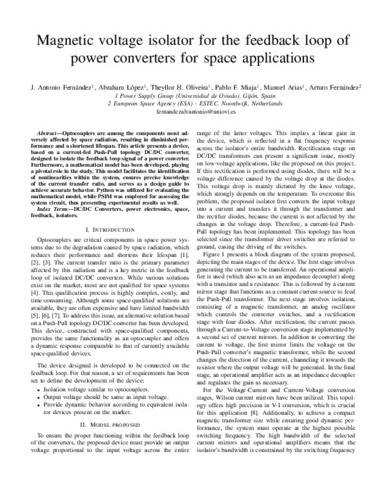Magnetic voltage isolator for the feedback loop of power converters for space applications
Palabra(s) clave:
DC/DC Converters
Power electronics
Space
Isolators
Fecha de publicación:
Editorial:
IEEE
Resumen:
Optocouplers are among the components most adversely affected by space radiation, resulting in diminished performance and a shortened lifespan. This article presents a device, based on a current-fed Push-Pull topology DC/DC converter, designed to isolate the feedback loop signal of a power converter. Furthermore, a mathematical model has been developed, playing a pivotal role in the study. This model facilitates the identification of nonlinearities within the system, ensures precise knowledge of the current transfer ratio, and serves as a design guide to achieve accurate behavior. Python was utilized for evaluating the mathematical model, while PSIM was employed for assessing the system circuit, thus presenting experimental results as well.
Optocouplers are among the components most adversely affected by space radiation, resulting in diminished performance and a shortened lifespan. This article presents a device, based on a current-fed Push-Pull topology DC/DC converter, designed to isolate the feedback loop signal of a power converter. Furthermore, a mathematical model has been developed, playing a pivotal role in the study. This model facilitates the identification of nonlinearities within the system, ensures precise knowledge of the current transfer ratio, and serves as a design guide to achieve accurate behavior. Python was utilized for evaluating the mathematical model, while PSIM was employed for assessing the system circuit, thus presenting experimental results as well.
Descripción:
IEEE Energy Conversion Congress & Expo, ECCE (2024. Phoenix, AZ.)
Patrocinado por:
This work has been financed by the European Space Agency (ESA), under the project High Bandwidth Magnetic Feedback Loop Circuit - ESA Contract No. 4000138724/22/NL/CRS/mkn and the Spanish minister of science, innovation and universities, though the project ”Nuevas topologías para un sistema de distribución secundario estandarizado en satélites” MCIU-22-PID2021-127707OBC21 and the FPI grant MCINN-23-PRE2022-101790.
Colecciones
Ficheros en el ítem




